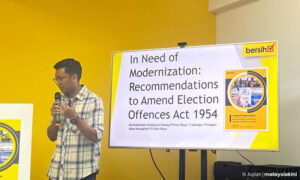By Qishin Tariq | The Star
The Federal Court ruled against creating an exception in lawyer-client privilege over the case of a lawyer attempting to reveal privileged information to defend himself.
The five-member panel, led by Justice Suriyadi Halim Omar, unanimously denied lawyer Gideon Tan’s appeal to include privileged information in an affidavit related to a case of contempt of court.
The legal dispute, initiated by Tan against his former clients Tey Por Yee and Ooi Kock Aun, was over a contentious portion of evidence in contempt proceedings that involved the three.
The panel, which also included Justices Zainun Ali, Ramly Ali, Zaharah Ibrahim and Jeffrey Tan Kok Wha, did not order any cost to be paid.
“I’m not encouraging your Lords and Ladies to open the floodgates, but when a person’s life and liberty are at stake, he is entitled to defend himself,” he said.
Floodgates referred to allowing other lawyers to breach lawyer-client confidentiality.
Tey’s lawyer Yudistra Darma Dorai said the rule was not just to protect lawyers, but also clients.
“Allowing an exception of defence would allow lawyers to be dragged to court and forced to divulge information,” he said.
He added that it would render useless Section 126 of the Evidence Act 1950, which ensured client confidentiality.
To this, Justice Suriyadi replied: “If you do you’re damned, if you don’t you’re damned.
“Are we to prohibit a man from defending himself?”
Lawyer for Ooi, Edmund Bon, said an absolutist point was essential as any exceptions would create legal loopholes that would allow lawyer-client privilege to be breached.
Amicus Curiae (Friend of the court) Nizam Bashir, who acted for the Bar Council, said their position was that no inroads should be made into the legal profession’s privilege to confidentiality.
On Oct 24 last year, the Court of Appeal dismissed Tan’s appeal, on the grounds that the right to defend himself in the committal proceedings did not create an exception to solicitor-client privilege.
That panel, led by Mohd Zawawi Salleh, found that the rule of solicitor-client privilege was absolute and ought not to be watered down with exceptions.



